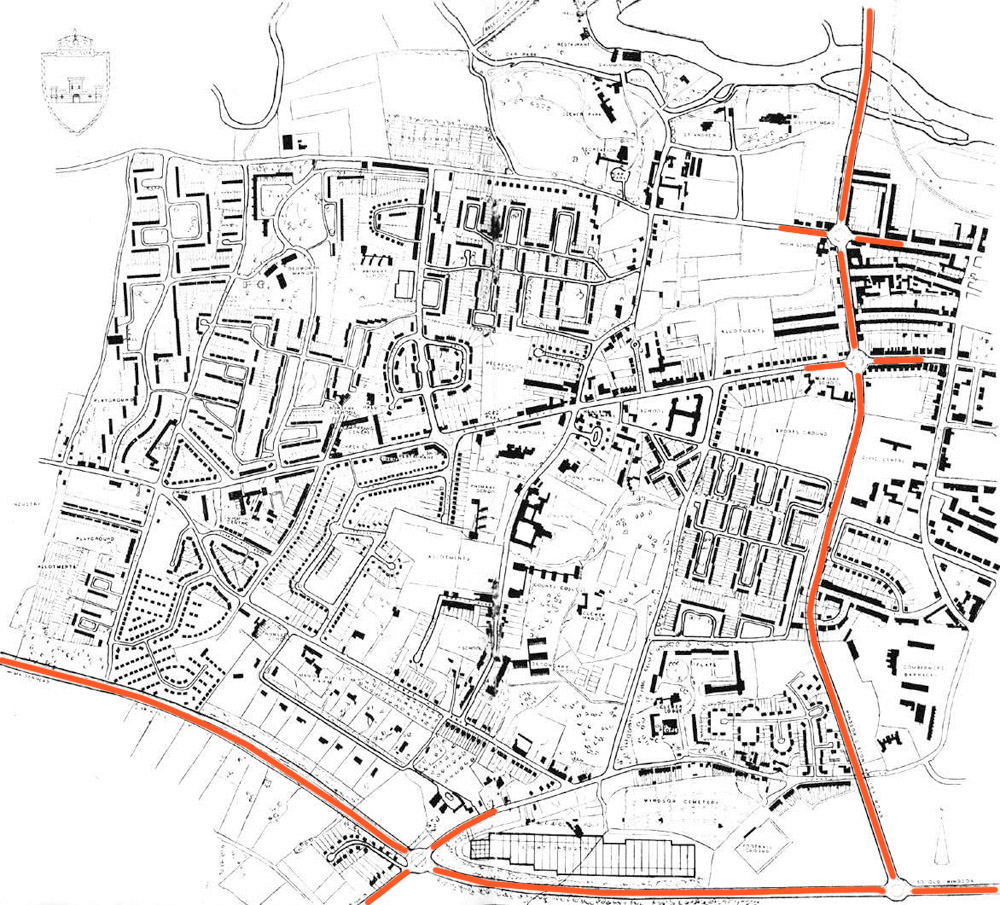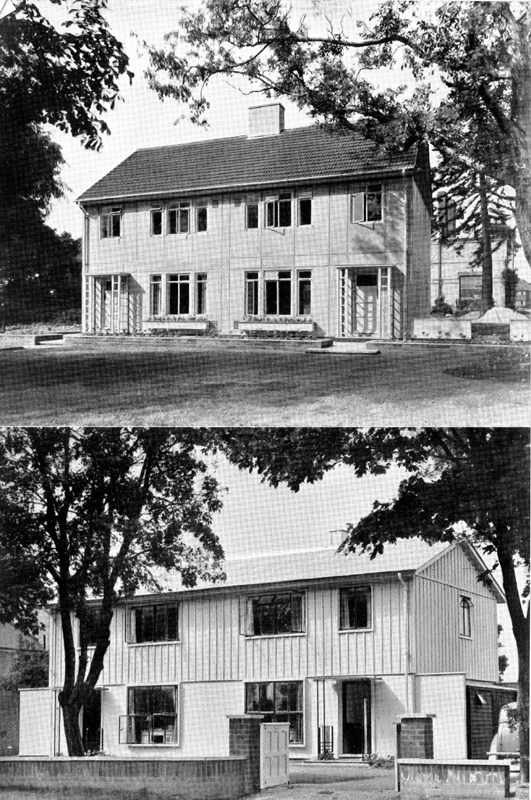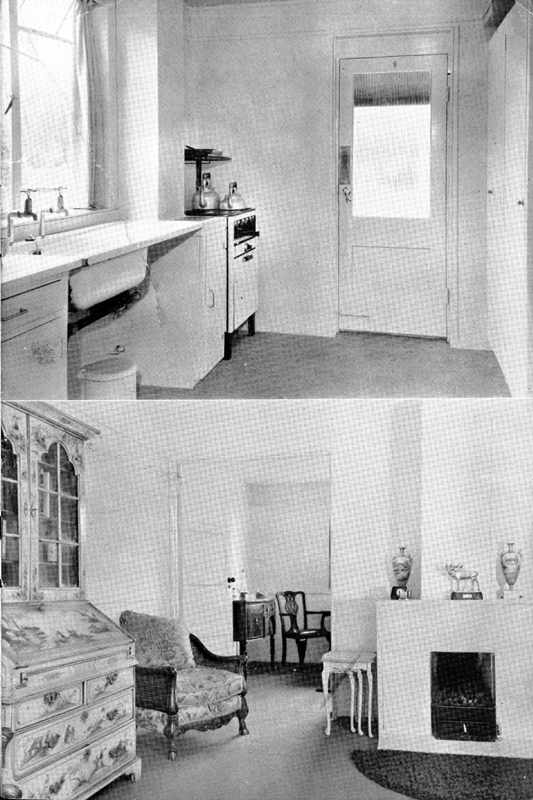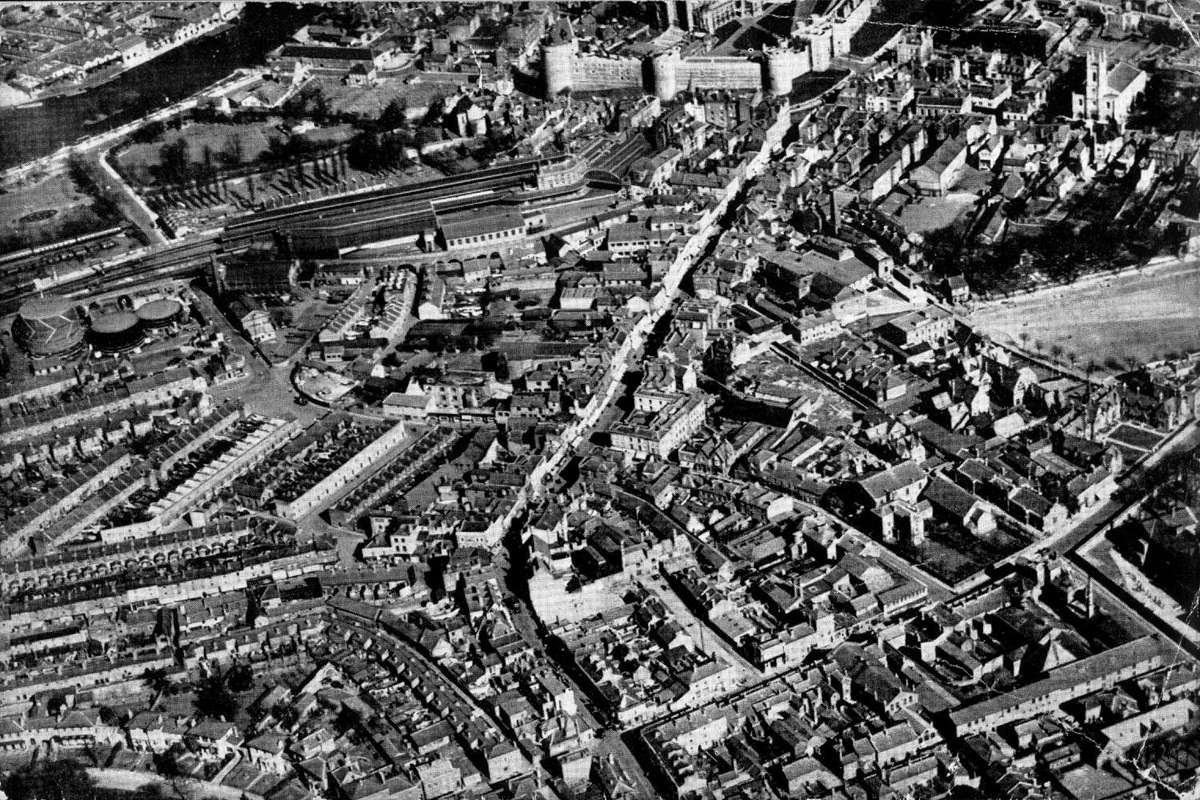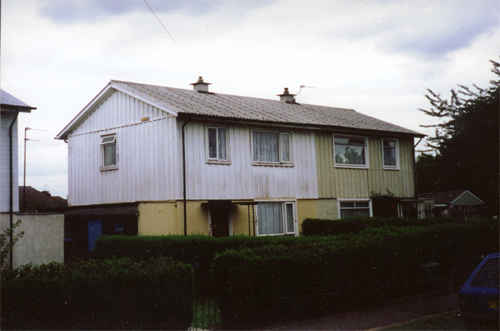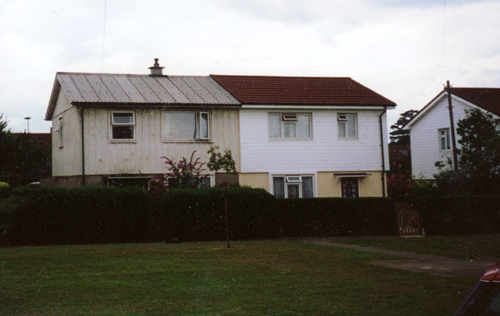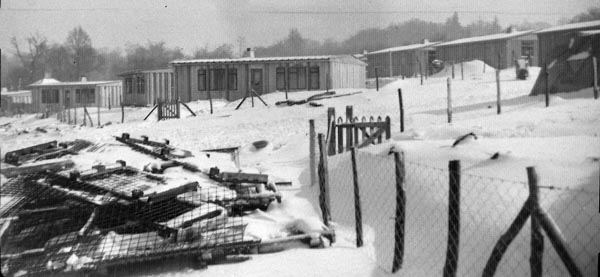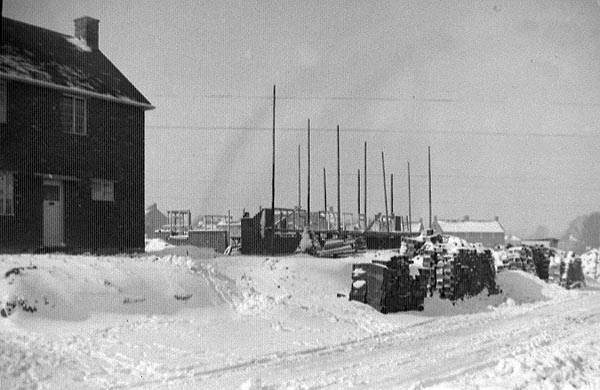
|
||||||||||||||||||||||||||||||||||||||||||||||
The following was published by the Windsor Labour Party in the autumn of 1946. In 1945 the Labour Party nationally had won the General Election, defeating Winston Churchill, and locally the Windsor Labour Party had won a small majority on the borough council. This booklet was produced to illustrate what had been achieved in Windsor over the previous twelve months. The text of this booklet 'Your Windsor Takes Shape' has been electronically scanned and checked but it may be that errors have crept in. Do please advise the editor if you identify anything that should be corrected. To contact us, please email Thamesweb Editor. |
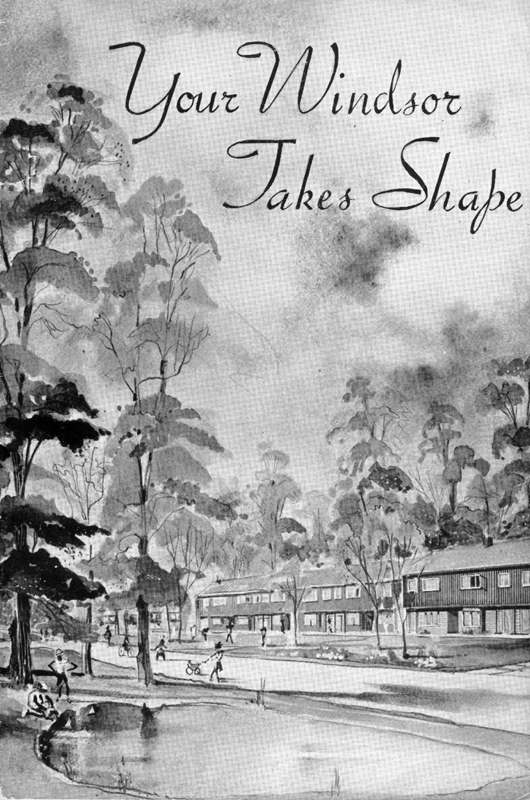
The Front Cover Modern Planning - A Sketch of a typical Close on a new housing estate as planned by Mr Chitty
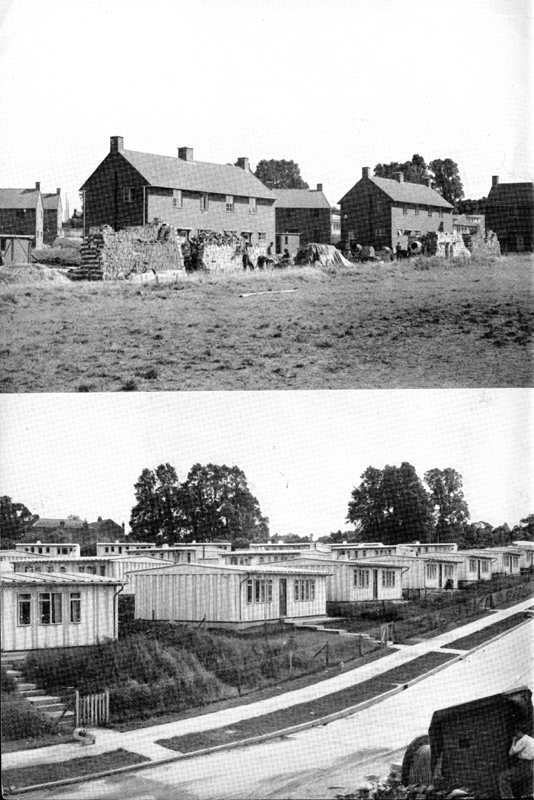
Inside Front Cover Top
Permanent Traditional Houses
A view of some of the first 32 being built. These are now finished and occupied.Bottom
Temporary Prefabricated Bungalows
50 are now occupied and 125 more are being built.
Contents
By Way of Introduction
Clearing the Decks
Housing
Planning
Civic and Social Centre
Public Services
Baths and Pleasure Grounds
Health
Education
The Cost
Conclusion
PUBLISHED BY THE
WINDSOR LOCAL LABOUR
PARTY AND PRINTED BY
LUFF & SONS, LTD.,
47, ST. LEONARD'S ROAD,
WINDSOR
SIXPENCE
By Way of Introduction
Twenty-one to Nineteen
The small Labour majority on the Windsor Town Council has been made to appear overwhelming, not only by the enthusiasm of the Labour members, but also by the ineffectiveness of the die-hard Conservative opposition, which has been confused and lazy, and by the fact that a few of the Conservatives - the more enlightened ones - have understood the sincerity of the Labour members and the value of their programme and have co-operated in carrying it out. The result has been that the policy which was presented to the electors last year in 'Your Windsor' has been put into operation. And now the Labour Party presents its report, so that those electors may know exactly how much has been done in less than a year.
Clearing the Decks
A year ago, members of the Council went to Committees with only the vaguest idea of the business of the meetings. The Conservatives who were in charge were content to leave most of the work to the paid officials and the organisation of the Committees to providence. The Council met in private and many of the Committees too early in the day for working people to attend.
Not so now. Members of the Council know at least 24 hours in advance just what business they will have to deal with. The Council meets in public at 7 p.m., a time convenient to most citizens; and no Committee meets before 6 p.m. The Committee system, the Standing Orders and the Financial Regulations are all being re-organised in time for the new Council year.
By now nearly all the cobwebs have been swept away-but it took the Labour Party to realise that they were there!
Housing
Twenty-five Years Ago
On the 14th May, 1921, the Windsor and Eton Express reported that, "Windsor Town Council spent an evening discussing the housing situation. The Housing Commissioner stated that he was satisfied there was a 'dire necessity' for houses in Windsor, but the Council decided not to build for at least another six months."
and Now
The Chairman of the Housing Committee of the Windsor Town Council, speaking at a public meeting on the 23rd July, 1946, said, "Your Labour Town Council hopes to have more houses, built or being built, in its first year of office than all the previous Independent or Conservative Windsor Town Councils built in all the 21 years between the two world wars."
The Promise and the Action
In 'Your Windsor' the Labour Party pledged itself, if elected in a majority to the Windsor Town Council, to make housing a first priority, to appoint a, qualified architect to design the houses, and to continue to consult housewives in the lay-out of the interiors.
All these things have been done, for the Labour Party WAS elected in a majority. Housing has been its chief concern, a qualified architect has been appointed to the Borough Engineer's Department, and five housewives have been co-opted to the Housing Committee.
Emergency
To provide emergency accommodation as swiftly as possible the Council has followed a vigorous policy of requisitioning all empty property in the town which could be adapted for housing. All adaptations permitted by the Ministry of Health have been made as quickly as the shortages of labour and materials have allowed; and where the Ministry would not permit the adaptations in requisitioned property the Council has agreed to purchase the property and has carried out the work itself. Altogether, more than 60 properties have been either requisitioned or purchased. More than 140 families have already been accommodated in them and 46 more families will soon be re-housed in further adaptations now rapidly being made.
It should be known that some Conservatives have opposed this policy, but the Labour majority was able to over-rule them and to carry out to the full its emergency housing programme, including the adaptation of several Nissen huts.
Temporary
Every effort has been made to speed up the supply of temporary prefabricated bungalows. Fifty have been erected and occupied, and work is going forward on a further 125. Perhaps they are not handsome structures, but nobody can deny that they are splendidly equipped; the kitchen, for instance, is a housewife's paradise. And the slope of the Clewer Manor site makes the appearance of the estate less unpleasing than that of most temporary bungalow sites.
Permanent
But the housing problem cannot be solved by emergency and temporary accommodation. Permanent houses are needed and the Council is trying to build as many as possible of them as quickly as it can. Difficulties have been enormous and seemingly never ending. Workmen have been few in any case, and even of those available some have been attracted to areas where higher wages are paid. The weather has been atrocious and has several times brought building to a stop. Building materials and many components of houses have been and still are in very short supply.
Progress has nevertheless been made. The first 32 brick-built houses have been completed and occupied. They are of an attractive Ministry of Works design. Each kitchen has plenty of cupboards and a refrigerator; the bedrooms are fitted with wardrobes. The W.C. is separate from the bathroom, and a shed for coals, cycles and a pram is provided with each house.
Contracts have been made for 32 slightly larger and equally well-equipped, brick-built houses. They are being built as fast as the shortage of labour and materials allows. Tenders for l 8 more of these have been approved by the Council, and work will start on them as soon as the approval of the Ministry of Health has been obtained.
A design for old people's bungalows has been approved by the Council and by the Ministry. They provide two bedrooms, so that relatives or a nurse may stay with the old people if necessary. They will be built in appropriate places on all the new estates, and not segregated in one colony. Tenders for 24 of them have been invited.
Work on the design of 6, 4, 2, and possibly 1-bedroom houses is being pushed ahead in the drawing office by the qualified architect now employed full-time in the Borough Engineer's Department. As a result there will emerge a plan, not merely to provide the number of houses required, but to provide them with the number of bedrooms needed by the families of the applicants.
The housing enthusiasts on the Council have long known that the supply of bricks and bricklayers would not be able to satisfy the demand for houses when building became possible. They therefore seriously considered the alternative methods to brick construction for permanent houses. Several methods were found satisfactory, and the Chairman of the Housing Committee and the Borough Engineer made a special visit to Whitehall to consult with the Ministry of Health about them. As a result 100 British Iron and Steel Federation Houses, which had been offered to larger and apparently less enthusiastic authorities, were allocated to Windsor. This was an outstanding achievement by the Labour Council, for without this special effort these fine houses would not have come to Windsor at all, A contract was made at once and work is in progress.
But, again, there were not enough men to prepare the site, so the Council agreed to pay more for imported labour, and the camp in the Great Park was acquired as accommodation for the workmen. The bad weather has, of course, impeded progress, but once the roads and sewers are ready the houses will be erected swiftly, for the method of construction is largely dry.
The houses are of steel and have passed the searching tests of the Ministry of Works with flying colours. They are beautifully equipped, well designed, and permanent in every way.
A contract for another 100 permanent houses of pre-cast, reinforced concrete has also been approved by the Council. These are Wates houses, made by the firm which played a prominent part in the construction of the famous 'Mulberry' harbours. They are fully approved by the Ministries and are to be built on the south side of the Dedworth Manor estate. The acquisition of this site was the cause of the only really serious opposition by the Conservatives. To speed up the purchase the Labour majority insisted on permission from the Council to buy the Manor and the land at whatever price the District Valuer had been able to negotiate. Most of the Conservatives, but not all, voted against this, but the Labour majority prevailed. When the price became known it was realised what a fine bargain had been made for the town. Unfortunately, there has been a delay in acquiring alternative ground for the Dedworth Road allotments, which are on part of the land needed for the Wates houses. The Labour majority has asked for similar powers to acquire an alternative site for the allotments. There was no Conservative opposition on that occasion. They have apparently realised that the District Valuer is the local authorities' safeguard. The alternative land has also been planned to take 36 of the larger brick-built houses, and 8 of the old people's bungalows, as well as the allotments.
Summary
140 |
||||
50 |
||||
32 |
||||
125 |
||||
132 |
||||
178 |
||||
46 |
||||
703 |
||||
372 |
||||
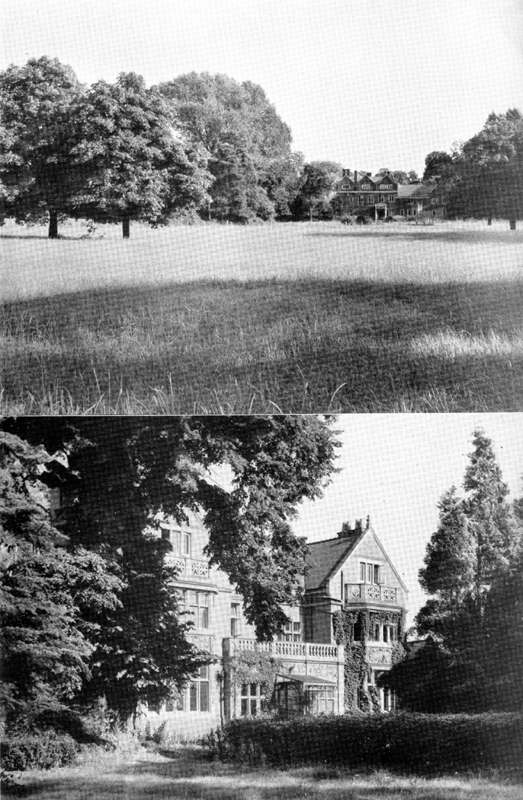
Dedworth Manor
Sutherland Grange
